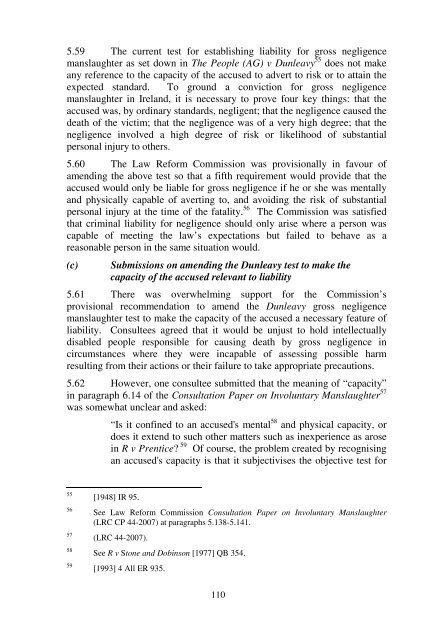murder and involuntary manslaughter - Law Reform Commission
murder and involuntary manslaughter - Law Reform Commission
murder and involuntary manslaughter - Law Reform Commission
Create successful ePaper yourself
Turn your PDF publications into a flip-book with our unique Google optimized e-Paper software.
5.59 The current test for establishing liability for gross negligence<strong>manslaughter</strong> as set down in The People (AG) v Dunleavy 55 does not makeany reference to the capacity of the accused to advert to risk or to attain theexpected st<strong>and</strong>ard. To ground a conviction for gross negligence<strong>manslaughter</strong> in Irel<strong>and</strong>, it is necessary to prove four key things: that theaccused was, by ordinary st<strong>and</strong>ards, negligent; that the negligence caused thedeath of the victim; that the negligence was of a very high degree; that thenegligence involved a high degree of risk or likelihood of substantialpersonal injury to others.5.60 The <strong>Law</strong> <strong>Reform</strong> <strong>Commission</strong> was provisionally in favour ofamending the above test so that a fifth requirement would provide that theaccused would only be liable for gross negligence if he or she was mentally<strong>and</strong> physically capable of averting to, <strong>and</strong> avoiding the risk of substantialpersonal injury at the time of the fatality. 56 The <strong>Commission</strong> was satisfiedthat criminal liability for negligence should only arise where a person wascapable of meeting the law’s expectations but failed to behave as areasonable person in the same situation would.(c)Submissions on amending the Dunleavy test to make thecapacity of the accused relevant to liability5.61 There was overwhelming support for the <strong>Commission</strong>’sprovisional recommendation to amend the Dunleavy gross negligence<strong>manslaughter</strong> test to make the capacity of the accused a necessary feature ofliability. Consultees agreed that it would be unjust to hold intellectuallydisabled people responsible for causing death by gross negligence incircumstances where they were incapable of assessing possible harmresulting from their actions or their failure to take appropriate precautions.5.62 However, one consultee submitted that the meaning of “capacity”in paragraph 6.14 of the Consultation Paper on Involuntary Manslaughter 57was somewhat unclear <strong>and</strong> asked:“Is it confined to an accused's mental 58 <strong>and</strong> physical capacity, ordoes it extend to such other matters such as inexperience as arosein R v Prentice? 59 Of course, the problem created by recognisingan accused's capacity is that it subjectivises the objective test for5556575859[1948] IR 95.See <strong>Law</strong> <strong>Reform</strong> <strong>Commission</strong> Consultation Paper on Involuntary Manslaughter(LRC CP 44-2007) at paragraphs 5.138-5.141.(LRC 44-2007).See R v Stone <strong>and</strong> Dobinson [1977] QB 354.[1993] 4 All ER 935.110
















